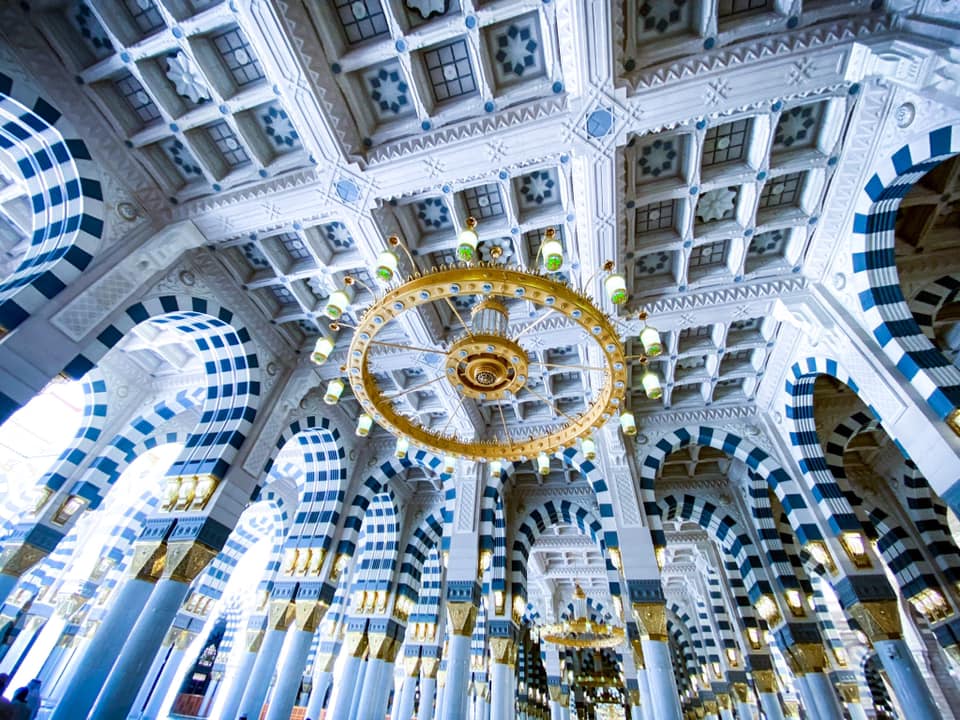Memoir Eng
Chapter 22: The One Who Taught Me Knowledge and Manners
“My name is Zulkifli bin Mohamad. I’m from Terengganu, Malaysia. Here, I’m studying in the Kuliyah of Syariah, Islamic University of Medina. I dream of one day becoming one of the arrows of Islam. To be shot anywhere…,” Zul introduced himself in the special usrah with Dr Abu Mu’az. Dr Abu Mu’az smiled and laughed, then said, “Zulkifli, you’ll be a great person one day…”
Other than Zul and Zaini, their other friends who are involved are Sobri, Jamaluddin, Abdul Hakim, Azmi, Borhanuddin and Abdul Qahhar including other students from South Thailand and Indonesia. Their usrah syllabus is a book al-Muntalaq by Syeikh Ahmad Rasyid. Dr Abu Mu’az is a lecturer at Ta’if University, Saudi Arabia. Besides him, the usrah is also handled by Dr Walid A’niy and their usrah is usually held in either Mecca or Medina. Now and again, Dr Walid A’aniy will tell a funny story to cheer our usrah sessions. “Back when I wanted to get married, I didn’t have money to do so. Did I give up? Of course not. What did I do? I borrowed money from the most frugal person I know. And would you believe it? I managed to borrow a total sum of money that is enough for my whole wedding! That is what you call the art in persuasion. It can also be used in dakwah…” Zul and the other usrah members broke into laughter.
“And that is the end of our usrah today. Insya-Allah we’ll meet again next month in ‘Arafah. I’ll inform the details of the location later. Don’t forget about the assignment I’ve given. You’re asked to discuss the characteristic differences between western and Islamic thoughts and how they can be used to handle the global crisis. Next, list out the 5 verses of the Quran regarding the destruction of previous nations and the lessons we can learn from them. We’ll end with tasbih kaffarah and surah al-‘Asr…” Dr Walid A’aniy said. Zul quickly notes the assignment in his notebook and shake hands with his teacher.
After the year 1966, Islamic movements were developing rapidly. According to the records, there are more than 60 Islamic organization movements around the world that also greatly influenced dakwah for NGOs such as ABIM, IRC, and PAS in Malaysia. Their influence also reaches the Islamic University of Medina which led students and lecturers to join the mujahidin groups to Syria, Palestine, Afghanistan and Bosnia Herzegovina every semester break. Their return is looked forward to and celebrated. However, if they did not receive any news from the groups that left, then there’s a possibility that that was their final farewell. Among those who joined the jihad to Bosnia is Shohor Bani. Last Zul heard, his friend is about to get married to a Bosnian girl. Muhammad an Egyptian Arab fellow will always share videos of the dakwah movement fight in the Middle east. They were close and Zul was invited several times to eat at his house.
Zul’s involvement in usrah, while he’s in Medina, is not as active as when he was in SMAASZA due to the factor of his tight schedule attending the halaqah at Nabawi Mosque. However, he took great interest in the development of Islamic movements worldwide including in Malaysia. During the Kuwait-Iraq war in 1990, the Islamic University of Medina declared a long holiday. The majority of Malaysian students return back home except Zul and several of his friends. Due to the campus closure, Zul moved out temporarily to Medina Malaysia Student Association (MMSA) house in Harratun Nasr, about 4-5 kilometres from Nabawi Mosque.
For a month, every day Zul would walk as he hold his books from MMSA house to Nabawi mosque to attend talaqqi classes with the masyaikh there. He would leave before Asar and return home after the ‘Isyak prayer. Sometimes he will miss his family and hometown but he sacrificed his feelings for his love of knowledge. It is enough for Zul that he got to go back to Malaysia once a year. The time he has left he used it fully to gain and seek the pearls of knowledge in Medina. As Zul walked on home after leaving the Nabawi Mosque, he ate the grapes he bought by the road one by one as he reminisces his childhood memories. The price for a kilogram of grapes is just SAR5.
That particular night, it was calmer and quieter than usual. The small road is just lit by the dim street lights. The engine’s roaring sound and the beam of the car’s headlights that passes through the night were the only ones accompanying Zul’s walk home to the MMSA house. Syeikh Muhammad ‘Ali Thani’s voice as he gave his lecture after the Maghrib prayer just now is still clear in Zul’s head.
“My dear students! Learning and seeking knowledge is an obligation and commandment for every person. The reason is, knowledge is the benchmark in our life when determining whether something is good or bad. Furthermore, Allah SWT also elevates those who are knowledgeable and raise their standing according to His statement:
يَرْفَعِ اللَّـهُ الَّذِينَ آمَنُوا مِنكُمْ وَالَّذِينَ أُوتُوا الْعِلْمَ دَرَجَاتٍ
“Allah will raise those who have believed among you and those who were given knowledge, by degrees.” [1]
According to the above statement of Allah SWT, we are certain of the rewards in the hereafter and the honour in this world for those who learn. Believers are elevated from the disbelievers and the knowledgeable above the non-knowledgeable. Ibnu Mas’ud radhiyallahu ‘anhu said, Allah SWT praises the scholars in this verse by which Allah raises the believers with the knowledge above believers who are not knowledgeable by several degrees. [2]
From Abu Hurairah RA, the Prophet PBUH said:
مَنْ سَلَكَ طَرِيقًا يَلْتَمِسُ فِيهِ عِلْمًا، سَهَّلَ اللهُ لَهُ بِهِ طَرِيقًا إِلَى الْجَنَّةِ، وَمَا اجْتَمَعَ قَوْمٌ فِي بَيْتٍ مِنْ بُيُوتِ اللهِ، يَتْلُونَ كِتَابَ اللهِ، وَيَتَدَارَسُونَهُ بَيْنَهُمْ، إِلَّا نَزَلَتْ عَلَيْهِمِ السَّكِينَةُ، وَغَشِيَتْهُمُ الرَّحْمَةُ وَحَفَّتْهُمُ الْمَلَائِكَةُ، وَذَكَرَهُمُ اللهُ فِيمَنْ عِنْدَه
“And whoever follows a path to seek knowledge therein, Allah will make easy for him a path to Paradise. No people gather together in one of the Houses of Allah, reciting the Book of Allah and studying it among themselves, except that sakeenah (tranquillity) descends upon them, and mercy envelops them, and the angels surround them, and Allah mentions them amongst those who are with Him.” [3]
According to Imam al-Nawawi, this hadith contains various knowledge, wisdom, methodologies and manners. Among them, the advantages of going out to seek knowledge and busying oneself with syar’ie knowledge on the condition that his intention is solely for Allah SWT is also mentioned. Although this is a condition for every worship, but it has been a custom of the scholars to bind this issue with it, for some people tend to overlook or are indifferent about it especially those who are just beginning and others like them.
What is meant by al-sakinah in this hadith? It is the blessings of Allah SWT… [4]
***************************
Fiqh class with Syeikh Dr Muhammad bin Muhammad al-Mukhtar al-Syinqiti is Zul’s favourite class. After the month-long break, he’s really looking forward to returning and meet his teacher again. The Syeikh’s name skyrocketed right after his PhD thesis titled Ahkam al-Jirahah al-Tibbiyyah wa al-Athar al-Mutarattibah ‘Alaiha which discusses the fiqh of surgery was published and passed with flying colours. Zul can still remember how both Syeikh ‘Atiyyah Salim and Syeikh Dr. ‘Umar ‘Abd al-Aziz sang praises of the quality of the thesis.
“Is it true that Imam al-Syafie rejected istihsan?” Syiekh asked his students in class. A student raised his hand, stands up and answered, “In my opinion, yes, he did reject istihsan. This is proven by the discussion he wrote regarding istihsan in the book al-Risalah. [5] Imam al-Syafie depicted istihsan as a form of negligence or indifference. If istihsan is permissible for a person in religious matters, surely it is permissible for any rational matter in the field of knowledge and also permissible for the sanctioning of religious matters in every chapter and ultimately everyone will sanction their own religion!” The Syeikh listened to the student’s argument as he gazes into the student’s face.
The Syeikh repositioned his syimagh before saying, “Young man, further and add to your reading. The istihsan that is rejected by Imam al-Syafie is istihsan that is only based on rational thought and desires (nafs) which completely disregards support from syarak evidences. According to Imam Ibn Qudamah al-Maqdisi, this type of istihsan is prohibited (haram) as agreed by all scholars and this is the istihsan that is practised by the general public with no knowledge. [6] If he truly rejects istihsan, why is it in his book al-Umm he stated that in his opinion, the actions employed by some judges who set a condition of holding the Quran as a person is taking his oath as a commendable matter? [7] Isn’t this a clear proof that Imam al-Syafie practised istihsan in issuing his ijtihad?”
Syeikh then ended his class that afternoon with the following conclusion, “Hence, the istihsan which is rejected by Imam al-Syaife is the opinion which isn’t based on the evidences from al-Quran, al-Sunnah, ijma’ or qiyas and this rejection is a form of hifz al-din (protection of the religion). As for istihsan which means the exception of general evidence according to the maslahah juz’ie, this is accepted by Imam al-Syafie and considered as supporting proof in various fiqh issues. Wallahua’lam.”
Normally, after Syeikh leaves the class, students will flock around him, accompanying him to his car as they ask him various fatwa and ruling issues. Zul observes in awe. One by one the questions asked are answered easily complete with dalil from al-Quran and hadith.
Trailing behind his teacher slowly, Zul continues to tune in to the questions by the students and the answers given by Syeikh. Suddenly, the Syeikh halted, bends down and pick up the bits and pieces of bread strewn on the road. Maybe some kids threw it there. Syeikh cleaned up the area and the bread is placed in a suitable place by the side of the road. The students who were there were amazed by the Syeikh actions and promptly helped him to pick them up.
Zul was both amazed and impressed watching the incident unfolds in front of him. The Syeikh is not only teaching his students of knowledge but also practices what he preaches. “Masya-Allah, how great is his manners with food…” Zul whispered to himself. Although it was just pieces of bread, the Syeikh still honours it for it is a gift from Allah SWT. If they are no longer beneficial for humans, maybe for the soaring birds.
As he walks back to his dormitory, Zul was lost in his thoughts, reflecting on what has happened. He remembered his sweet memories with the masyaikhs. Occasionally, when they were bored in class, both the students and the masyaikh will go for tanazzuh [8] far away from people. Under the date tree, with the wind blowing over them, they’ll read a book and discuss amongst themselves. After the lessons, everyone will work together to cook and enjoy their meal together. How wonderful it is, Allah SWT reaches His slaves and teaches in various forms. The land of Medina taught him the meaning dakwah and tarbiah through usrah. It is also the land that taught him knowledge and manners through his own teachers.
___________________________________________
[1] Surah al-Mujadalah: 11 [2] Tafsir al-Qurthubi, 17/299 [3] Sahih Muslim, no. 4867 [4] Syarh al-Nawawi ‘ala Muslim, 17/21 [5] Al-Risalah, p. 507 [6] Raudhah al-Nazir,1/475 [7] Al-Umm, 6/278 [8] Cleansing oneself from external distractions or sins through activities such as religious classes and good deeds
